| Listing 1 - 10 of 12 | << page >> |
Sort by
|
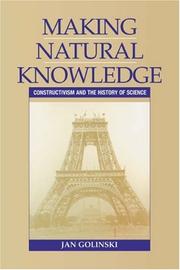
ISBN: 0521444713 0521449138 9780521449137 9780521444712 Year: 1998 Publisher: Cambridge Cambridge University Press
Abstract | Keywords | Export | Availability | Bookmark
 Loading...
Loading...Choose an application
- Reference Manager
- EndNote
- RefWorks (Direct export to RefWorks)
Methodology of economics --- Science --- Constructivism (Philosophy) --- History --- Historiography --- Historiography. --- History. --- Constructivism (Philosophy). --- Philosophy --- Science - History --- Science - Historiography
Book
ISBN: 3518061038 9783518061039 Year: 1974 Publisher: Frankfurt am Main Suhrkamp
Abstract | Keywords | Export | Availability | Bookmark
 Loading...
Loading...Choose an application
- Reference Manager
- EndNote
- RefWorks (Direct export to RefWorks)
Philosophy of science --- Science --- Philosophy --- Historiography --- -Science --- -Natural science --- Science of science --- Sciences --- -Philosophy --- Normal science --- Science - Philosophy --- Science - Historiography
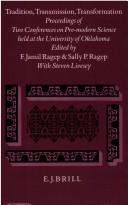
ISBN: 9004101195 9789004101197 Year: 1996 Volume: 37 Publisher: Leiden Brill
Abstract | Keywords | Export | Availability | Bookmark
 Loading...
Loading...Choose an application
- Reference Manager
- EndNote
- RefWorks (Direct export to RefWorks)
Science --- History --- Congresses. --- Historiography --- -Science --- -Natural science --- Science of science --- Sciences --- -Congresses --- -Historiography --- Natural science --- Historiography&delete& --- Congresses --- History&delete& --- Natural sciences --- Science - History - Congresses. --- Science - Historiography - Congresses.
Book
ISSN: 00680346 ISBN: 9783319302270 9783319302294 3319302272 3319302299 Year: 2016 Volume: 319 Publisher: Cham : Springer International Publishing : Imprint: Springer,
Abstract | Keywords | Export | Availability | Bookmark
 Loading...
Loading...Choose an application
- Reference Manager
- EndNote
- RefWorks (Direct export to RefWorks)
This volume collects reflections on the role of philosophy in case studies in the history of science. Case studies have played a prominent role in recent history and philosophy of science. They have been used to illustrate, question, explore, or explicate philosophical points of view. Even if not explicitly so, historical narratives are always guided by philosophical background assumptions. But what happens if different philosophies lead to different narratives of the same historical episodes? Can historical case studies decide between competing philosophical viewpoints? What are the criteria that a case study has to fulfill in order to be philosophically relevant? Bringing together leading practitioners in the fields of history and philosophy of the physical and the life sciences, this volume addresses this methodological problem and proposes ways of rendering explicit philosophical assumptions of historical work.
Philosophy of science --- History as a science --- Science --- Philosophy and science --- History --- Historiography --- Philosophy --- Science - Historiography --- Science - Philosophy --- History. --- Philosophy and science. --- History of Science. --- Philosophy of Science.
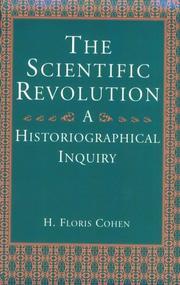
ISBN: 0226112802 9780226112794 9780226112800 0226112799 Year: 1994 Publisher: Chicago University of Chicago press
Abstract | Keywords | Export | Availability | Bookmark
 Loading...
Loading...Choose an application
- Reference Manager
- EndNote
- RefWorks (Direct export to RefWorks)
Science --- Sciences --- History. --- Historiography. --- Histoire --- Historiographie --- 378.4 --- -Science --- -Natural science --- Science of science --- Universiteiten --- History --- Historiography --- -Universiteiten --- 378.4 Universiteiten --- -378.4 Universiteiten --- Natural science --- Europe --- Science - History. --- Science - Europe - History. --- Science - Historiography.
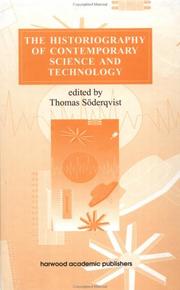
ISBN: 3718659069 9783718659067 9780203726914 9781135851606 9781135851675 9781135851743 Year: 2012 Volume: 4 Publisher: New York Routledge
Abstract | Keywords | Export | Availability | Bookmark
 Loading...
Loading...Choose an application
- Reference Manager
- EndNote
- RefWorks (Direct export to RefWorks)
Today, an increasing number of historians are turning to the history of recent and contemporary science. When doing so, they are confronted with new and unfamiliar methodological and theoretical problems: How to handle the huge amounts of published and unpublished sources? Is it possible to write a synthetic history of recent science? What level of scientific training is necessary to understand recent and contemporary science? Does the lack of historical distance prevent good scholarship? Can (and will) historians of recent science share the turf with other professional groups, such as active scientists, scholars of science and technology studies, and science journalism? How to deal with scientists' and technocrats' constant interference with our work? Whose history are we writing? Whose science? The thirteen contributors to this volume are active researchers in what has been called 'the last frontier' in the history of science.
Science --- Technology --- Historiography --- Historiographies --- Applied science --- Arts, Useful --- Science, Applied --- Useful arts --- Industrial arts --- Material culture --- Natural science --- Science of science --- Sciences --- history --- Conferences - Meetings --- Natural sciences --- Science - Historiography - Congresses. --- Technology - Historiography - Congresses.

ISBN: 9780415391429 0415391423 9780415272940 0415272947 0203323882 9780203323885 9781134482924 9781134482962 9781134482979 Year: 2010 Volume: 23 Publisher: Abingdon Routledge
Abstract | Keywords | Export | Availability | Bookmark
 Loading...
Loading...Choose an application
- Reference Manager
- EndNote
- RefWorks (Direct export to RefWorks)
This book of essays presents insightful historical analyses of issues in the sciences, in technology and in medicine our contemporary world is confronting. It is about what we know--and don't yet know--about science, technology, and medicine in the recent past, and addresses new methods that historians can use to explore these developments. For historians, philosophers, and sociologistis of science, technology and medicine, the book will be a valuable guide on how to make their discipline more relevant by their researches and in their teaching.
Science. --- Historiography. --- Medicine. --- Technology. --- Science --- Technology --- Medicine --- Sciences --- Technologie --- Médecine --- Historiography --- Historiographie --- Médecine --- Arts, Industrial --- Industrial Arts --- Cloud Computing --- Medical Specialities --- Medical Specialties --- Medical Specialty --- Specialities, Medical --- Specialties, Medical --- Specialty, Medical --- Medical Speciality --- Speciality, Medical --- Health Workforce --- Historiographies --- Applied science --- Arts, Useful --- Science, Applied --- Useful arts --- Industrial arts --- Material culture --- Science - Historiography --- Technology - Historiography --- Medicine - Historiography
Book
ISBN: 9048194210 9786613085719 9048194229 1283085712 Year: 2011 Publisher: Dordrecht, The Netherlands : Springer,
Abstract | Keywords | Export | Availability | Bookmark
 Loading...
Loading...Choose an application
- Reference Manager
- EndNote
- RefWorks (Direct export to RefWorks)
This volume in the Brazilian Studies in the Philosophy and History of Science is the first attempt to present to a general audience some works which have been done in Brazil on ths subject. The included papers are original, reaching a remarkable number of relevant topics of philosophy of science, logic and on the history of science. The Brazilian community has increased in the last years in quantity and in quality of the works, most of them being published in respectable international journals on the subject. There is an informal but general among the philosophers and historians of science that the works must be of high quality, and we hope this volume may contribute to widespread this idea. The chapters of this volume are forwarded by a general introduction, which aims at to sketch not only the contents of the chapters, but it is conceived as a historical and conceptual guide about the development of field, as developed in Brazil. The introduction intends to be be very useful to the interestes readers, and not only to the specialists helping them to evaluate the production of this country that it is raising up in the international context.
Philosophy and science. --- Philosophy. --- Science -- Historiography. --- Science -- Philosophy. --- Science. --- Philosophy & Religion --- Philosophy --- Research --- Science --- History. --- Logic. --- Philosophy of Science. --- History of Science. --- Argumentation --- Deduction (Logic) --- Deductive logic --- Dialectic (Logic) --- Logic, Deductive --- Intellect --- Psychology --- Reasoning --- Thought and thinking --- Annals --- Auxiliary sciences of history --- Normal science --- Philosophy of science --- Methodology --- Science and philosophy
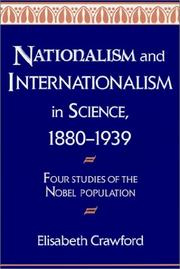
ISBN: 0521403863 9780521524742 9780511599699 9780521403863 0521524741 0511599692 Year: 1992 Publisher: Cambridge Cambridge University press
Abstract | Keywords | Export | Availability | Bookmark
 Loading...
Loading...Choose an application
- Reference Manager
- EndNote
- RefWorks (Direct export to RefWorks)
The founding of the Nobel Prize in 1901 confirmed the internationalisation of science. The workings of the Nobel institution rested on an international community of scientists who forwarded candidates for the prizes. Along with the candidates and eventual prizewinners, they constituted the Nobel population, which in the fields of chemistry and physics between 1901 and 1939 numbered over one thousand scientist renown from twenty-five countries. Crawford uses this Nobel population for prosopographic studies that shed new light on national and international science between 1901 and 1939. Her four studies examine the following problems: the upsurge of nationalism among scientists of warring nations during and after World War I; the existence of a scientific centre and periphery in Central Europe; the élite conception of science in the United States; and the effective use of the Nobel prizes in an organisation whose primary purpose was to further national science.
Sociology of knowledge --- Pure sciences. Natural sciences (general) --- anno 1800-1999 --- Competition, International --- -Nobel Prizes --- -Science --- -Scientists --- -Professions --- Natural science --- Science of science --- Sciences --- Awards --- International competition --- World economics --- International relations --- International trade --- War --- Historiography --- International cooperation --- -History --- -International cooperation --- -Historiography --- Economic aspects --- Nobel Prizes --- Science --- Scientists --- Professional employees --- History --- 19th century --- 20th century --- Nobel prizes --- United States --- Europe --- Competition [International ] --- Science - Historiography. --- Science - International cooperation - History - 19th century. --- Science - International cooperation - History - 20th century. --- Nobel prizes - Historiography. --- Scientists - United States - Historiography. --- Scientists - Europe - Historiography. --- Competition, International - Historiography. --- Historiography. --- International cooperation. --- Natural sciences --- Arts and Humanities
Book
ISBN: 9400791933 1402096038 9786612364426 1282364421 1402096046 Year: 2009 Publisher: [Dordrecht] : Springer,
Abstract | Keywords | Export | Availability | Bookmark
 Loading...
Loading...Choose an application
- Reference Manager
- EndNote
- RefWorks (Direct export to RefWorks)
The texts of Boris Hessen and Henryk Grossmann assembled in this volume are important contributions to the historiography of the Scientific Revolution and to the methodology of the historiography of science. They are of course also historical documents, not only testifying to Marxist discourse of the time but also illustrating typical European fates in the first half of the twentieth century. Hessen was born a Jewish subject of the Russian Czar in the Ukraine, participated in the October Revolution and was executed in the Soviet Union at the beginning of the purges. Grossmann was born a Jewish subject of the Austro-Hungarian Kaiser in Poland and served as an Austrian officer in the First World War; afterwards he was forced to return to Poland and then because of his revolutionary political activities to emigrate to Germany; with the rise to power of the Nazis he had to flee to France and then America while his family, which remained in Europe, perished in Nazi concentration camps. Our own acquaintance with the work of these two authors is also indebted to historical context (under incomparably more fortunate circumstances): the revival of Marxist scholarship in Europe in the wake of the student movement and the professionalization of history of science on the Continent. We hope that under the again very different conditions of the early twenty-first century these texts will contribute to the further development of a philosophically informed socio-historical approach to the study of science.
Grossmann, Henryk, 1881-1950. --- Hessen, Boris. --- Science -- Historiography. --- Science -- History. --- Science --- Sciences - General --- History - General --- History & Archaeology --- Physical Sciences & Mathematics --- Historiography --- History --- Historiography. --- History. --- Grossmann, Henryk, --- Grossman, Henryk --- Grossmann, Heinrich, --- Grossmann, H. --- Grossman, Henryk, --- Grossman, Chaskel, --- Science. --- Philosophy and science. --- Philosophy and social sciences. --- Physics. --- History of Science. --- Philosophy of Science. --- Science, general. --- Philosophy of the Social Sciences. --- History and Philosophical Foundations of Physics. --- Social sciences --- Science, Humanities and Social Sciences, multidisciplinary. --- Philosophy. --- Social philosophy --- Social theory --- Normal science --- Philosophy of science --- Annals --- Auxiliary sciences of history --- Natural philosophy --- Philosophy, Natural --- Physical sciences --- Dynamics --- Social sciences and philosophy --- Science and philosophy
| Listing 1 - 10 of 12 | << page >> |
Sort by
|

 Search
Search Feedback
Feedback About UniCat
About UniCat  Help
Help News
News